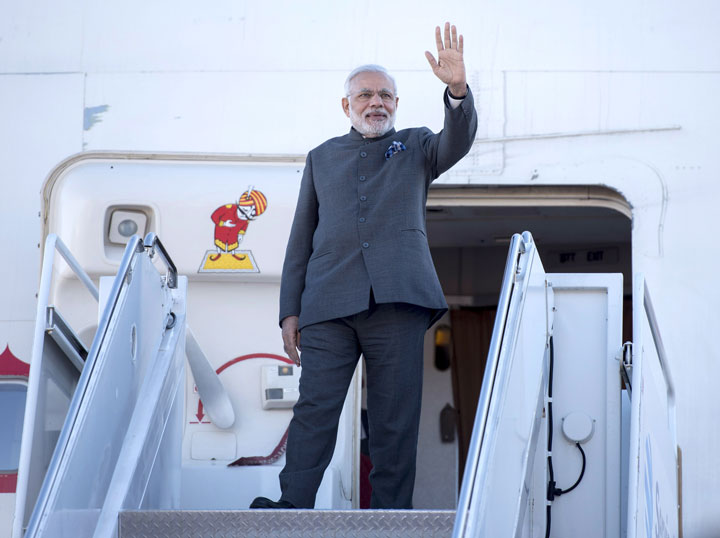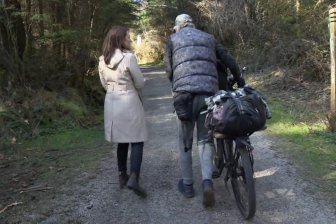OTTAWA – From trade, to energy, to the environment, to security, to culture, Prime Minister Stephen Harper will have no shortage of topics to discuss with visiting Indian Prime Minister Narendra Modi over the next three days.

Harper will also have an unspoken domestic political dividend – boosting his party’s standing with Canada’s 1.2 million Indo-Canadians as an October federal election looms.
READ MORE: After huge win, next Indian PM begins victory lap
After a formal meeting Wednesday, Harper will accompany the charismatic Modi to Toronto and Vancouver and will have no less than 16 fellow Conservatives appearing with them at various events, from cabinet ministers to MPs.
A number of prominent federal Conservative MPs, including Defence Minister Jason Kenney and Employment Minister Pierre Poilievre, were on hand to greet the Indian prime minister when his plane touched down Tuesday in Ottawa.
“This seems to be a win-win situation for Harper,” said Roland Paris, the founding director of the University of Ottawa’s Centre for International Policy Studies.
“He can promote deeper economic and diplomatic links with India while also scoring political points at home with the Indo-Canadian community.”
Harper’s fondness for diaspora politics is well known. His tough talk towards Russia is seen as a way of courting the 1.2 million Canadians of Ukrainian descent, for instance.
Last year Harper highlighted the pre-eminence of Indian immigration during a major speech in Toronto.
“Today, India is Canada’s top source country for immigrants,” he said. “And this explains why Canada’s Indo-Canadian community is over 1.2 million strong and continuing to grow.”
But Kasi Rao, a vice president of the Asia Pacific Foundation of Canada, said the Indo-Canadian community is no more uniform in its voting habits than any other segment of Canadians.
“The Indo-Canadian community has made strides in all parties in Canada, federally and provincially and I think the community has now deepened in Canada,” he said.
It is exactly those deep roots that can allow progress in a number of key economic areas, including boosting trade and investment as well as ever-expanding post-secondary education exchanges, he said.
Finalizing a deal – now two years in the making – that would see Saskatchewan’s Cameco Corp (TSX:CCO) export peaceful nuclear material to India will also be a major priority.
Paris said economic progress between the two countries can’t come soon enough for Canada.
“A successful visit isn’t enough. After nearly a decade in office, the Harper government has missed many opportunities to deepen Canada’s links with the emerging powers of Asia,” he said.
Others urge the two leaders to do more on tackling climate change.
Louise Comeau, executive director of Climate Action Network Canada, would like to see Modi and Harper prod each other to make strong commitments to reduce greenhouse gases ahead of the UN climate conference in Paris in December.
“Neither country is performing to its best potential,” she said. “We have a very large population in Canada with connections in India – we have opportunities for trading in clean energy.”
The visit will also give Canadians their first glimpse of Modi, who swept to power last May.
Modi is expected to get a rock star welcome at a Toronto arena on Thursday night.
But another group – calling themselves Sikhs for Justice – wants Modi indicted on torture charges while in Canada, alleging he was complicit in the 2002 anti-Muslim riots in the Indian state of Gujarat.
- Iran fires air defences at military base after suspected Israeli drone attack
- U.S. aid to Ukraine, Israel set to pass. But bills differ in one key area
- Carbon rebate labelling in bank deposits fuelling confusion, minister says
- Senator references ‘Trumpian denialism’ in foreign interference debate around China



Comments